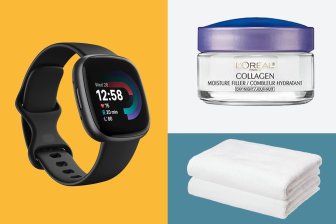It used to be that patients would walk into a plastic surgeon’s office with magazine clippings requesting Angelina Jolie’s lips or Nicole Kidman’s nose. Now they’re showing surgeons their own selfies with Snapchat and Instagram filters, asking to look like retouched versions of themselves.

Experts have dubbed it “Snapchat dysmorphia” and researchers fear that it’s informing social media users with an unrealistic and unattainable beauty ideal.
READ MORE: Instagram can be bad for mental health — but the company wants to fix that
In a study overview published in JAMA Facial Plastic Surgery, three researchers in the department of dermatology at the Boston University School of Medicine analyzed industry studies and research, and found that people sought out surgical treatments to look like the filtered and altered versions of themselves, including with “fuller lips, bigger eyes, or a thinner nose.”
“This is an alarming trend because those filtered selfies often present an unattainable look and are blurring the line of reality and fantasy for these patients,” they wrote.
The reason it’s so dangerous — and why they’re comparing it to body dysmorphia, a mental health condition in which a person obsesses about their perceived physical flaws — is because these filtered images are giving people the impression that they have the capacity to look “perfect.”
“These apps allow one to alter his or her appearance in an instant and conform to an unrealistic and often unattainable standard of beauty,” the article states.
READ MORE: Is generation Z glued to technology? ‘It’s not an addiction; it’s an extension of themselves.’
It may seem like plastic surgery as an industry is entirely based on the pursuit of unattainable beauty, but experts say this new phase is more pronounced because people, especially young people, are constantly snapping and seeing pictures of themselves.
“The experience of younger humans in particular in this regard, how they relate to their own appearance, is so profoundly different than at any other point in time,” Dr. Patrick Byrne, director of the Facial Plastic and Reconstructive Department at the Johns Hopkins University School of Medicine, said to CNN.
“We used to have photographs, of course, but we gazed upon them and thought about them infrequently. Now, we’re in this world where people are exposed to their own facial image thousands of times per year.”
His observation was echoed by U.K. celebrity plastic surgeon Dr. Tijion Esho, who first used the term “Snapchat dysmorphia” earlier this year.
“There is now a generation of both women and men who are more visually aware than ever before,” he said to the Independent. “Today’s generation … are born into an age of social platforms where their feelings of self-worth can be based purely on the number of likes and followers that they have, which is linked to how good they look or how great these images are.”
In fact, according to data from the American Academy of Facial Plastic and Reconstructive Surgery, in 2017, 55 per cent of surgeons said their patients requested procedures specifically for the purpose of looking better in selfies, compared to 42 per cent in 2016.
READ MORE: Selfies are putting young women at risk for depression, anxiety
In the past, Byrne says, patients used to get rhinoplasty to remove the dorsum (or hump) on their nose, now they’re more concerned with facial symmetry — which is more likely to produce a perfect-looking picture. And it’s a lot easier to disseminate that “perfect” picture to everyone you know.
“Models and actors were made to look perfect in magazines and ads, but the general public did not have easy access to methods to alter their own appearance,” the JAMA article states.
“Today, with apps like Snapchat and Facetune, that same level of perfection is accessible to everyone. Now, it is not just celebrities propagating beauty standards: it is a classmate, a coworker, or a friend.”






Comments